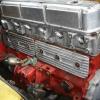Neutral coasting (read: not clutch coasting) in manual's is fine right?
I understand why it's bad in manual to clutch coast at speed for distances in gear, is it a similar reason for auto's?
I sort of understand how an auto determines which is the best gear to use (Through pressurised valves? + kickdown cable + road speed etc. determines which gear the box should be in).
Now my understand was that "1, 2, 3" are one way cogs, while "Drive and overdrive" are 'freewheeled' cogs (i.e. very much like your pushbike freewheel).
Now, my second understanding was that, an auto gearbox actually changes gears by changing the flow of oil through the box? (i.e. pressured valves) which makes the different gears turn.
Not really understanding the connection between how manual synchro and auto synchro works and why it's bad to neutral coast in an auto - but fine in a manual.
Cheers, hope that makes sense ~_~
Edited by Loki, 10 July 2006 - 12:13 AM.





 View Garage
View Garage









